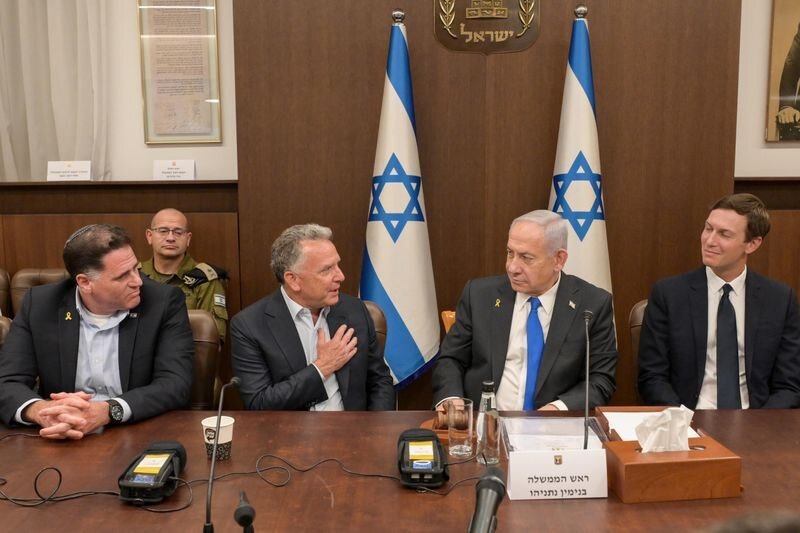The protected criminal syndicate
How long can Israel evade international scrutiny with Western support?

TEHRAN – The Thirtieth Session of the Conference of the States Parties to the Chemical Weapons Convention (CSP30), which opened on November 24, is meant to symbolize international cooperation against the scourge of chemical weapons. Delegates gather to reaffirm collective responsibility, transparency, and the shared determination to prevent the horrors of WMD use.
Yet even as states speak of progress, one contradiction overshadows the proceedings. Israel has acceded to no disarmament treaty whatsoever — not the Chemical Weapons Convention, not the Nuclear NonProliferation Treaty (NPT) not any binding framework designed to restrict weapons of mass destruction. This refusal makes Israel the single greatest obstacle to the establishment of a Middle East free of nuclear and chemical weapons, a vision long endorsed by the United Nations but blocked in practice by Tel Aviv’s defiance.
German endorsement
Western complicity was laid bare when German Chancellor Friedrich Merz described Israel’s June 2025 strikes on Iran as “the dirty work Israel is doing for all of us.” By using this phrase, Merz admitted that Israel acts as an instrument of the West, carrying out attacks that others prefer not to undertake openly. The remark is damning: it acknowledges the illegality and immorality of the strikes while simultaneously endorsing them. Germany’s statement exposes the hypocrisy of Western governments that claim to uphold international law but celebrate violations when committed by their allies.
Nuclear rhetoric
The danger posed by Israel is not hypothetical. Prime Minister Benjamin Netanyahu has repeatedly used the UN General Assembly stage to threaten Iran with nuclear imagery. In 2012, he brandished a cartoon bomb illustration to dramatize his warnings. In 2023, he was accused of explicitly invoking a “credible nuclear threat” against Iran — a statement condemned by Tehran as reckless and destabilizing.
More chillingly, in November 2023 Israel’s Heritage Minister Amichai Eliyahu suggested that “nuking Gaza” was an option. Though Netanyahu suspended him from cabinet meetings and disavowed the remark, the fact that such rhetoric emerged from a sitting minister illustrates how nuclear blackmail and genocidal threats have become normal in Israeli political discourse. These statements are not isolated slips; they reflect a political culture where the use of weapons of mass destruction against civilian populations is openly contemplated, even if later walked back.
Regional aggression
Israel’s record of military campaigns in Gaza, Lebanon, Syria, and Iran demonstrates its willingness to act outside international law. Reports from Western media have documented the use of banned weapons such as white phosphorus in densely populated areas, leaving civilians to bear the brunt of indiscriminate attacks. Since October 7, 2023, close to 70,000 Palestinians have been killed in Gaza as a result of its brutal war. In Lebanon, Israeli strikes over the past two years have killed around 4,000 people, underscoring the regional scale of destruction.
What makes this record even more alarming is Israel’s reliance on Westernsupplied weaponry in carrying out these assaults. U.S.made fighter jets, precision missiles, and Europeanmanufactured artillery have all been deployed in strikes that devastated civilian populations in Gaza and Lebanon. Human rights organizations and media investigations have traced the origins of these weapons, showing how Western governments enable Israel’s campaigns by providing the very tools used in mass killings.
The combination of banned munitions, Western arms, and staggering civilian casualties underscores a double impunity: Israel operates above the law, immune from accountability, while its allies evade responsibility for arming it and endorsing its actions.
Western interests
Israel’s impunity is not accidental; it is cultivated. The West wants Israel to evade international law because its unchecked militarism serves Western strategic interests in West Asia. Shielded by the United States at the UN and armed with Western technology, Israel destabilizes the region in ways that benefit its allies. Responsibility for Israel’s behavior lies not only in Tel Aviv but also in Washington, Berlin, and other capitals that enable and encourage its defiance.
Iran’s warning
At CSP30, Iran’s Foreign Minister Abbas Araghchi criticized Israel’s refusal to join the Chemical Weapons Convention and warned of its destabilizing role. His comments, though diplomatic, underscored the broader truth: Israel’s nuclear shadow threatens not only Iran but the entire international order. By blocking the creation of a Middle East WMDfree zone, Israel ensures that peace and stability remain elusive.
On the occasion of CSP30, the international community must confront the hypocrisy of tolerating Israel’s arsenal and aggression. According to the Federation of American Scientists (FAS) Nuclear Notebook, Israel is estimated to possess around 90 nuclear warheads, with other independent analysts suggesting the number could be closer to 200. Its refusal to accede to any disarmament treaty makes it the central obstacle to peace in West Asia and the world. If disarmament regimes are to retain credibility, they must hold Israel accountable, or risk rendering the lofty commitments of CSP30 meaningless.
